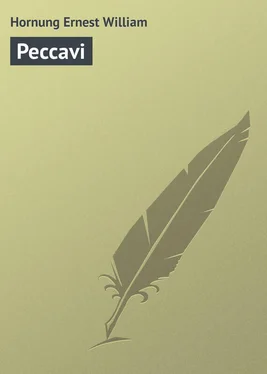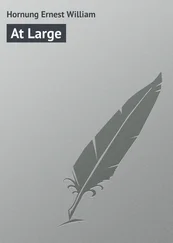Ernest Hornung - Peccavi
Здесь есть возможность читать онлайн «Ernest Hornung - Peccavi» — ознакомительный отрывок электронной книги совершенно бесплатно, а после прочтения отрывка купить полную версию. В некоторых случаях можно слушать аудио, скачать через торрент в формате fb2 и присутствует краткое содержание. Жанр: foreign_prose, на английском языке. Описание произведения, (предисловие) а так же отзывы посетителей доступны на портале библиотеки ЛибКат.
- Название:Peccavi
- Автор:
- Жанр:
- Год:неизвестен
- ISBN:нет данных
- Рейтинг книги:3 / 5. Голосов: 1
-
Избранное:Добавить в избранное
- Отзывы:
-
Ваша оценка:
- 60
- 1
- 2
- 3
- 4
- 5
Peccavi: краткое содержание, описание и аннотация
Предлагаем к чтению аннотацию, описание, краткое содержание или предисловие (зависит от того, что написал сам автор книги «Peccavi»). Если вы не нашли необходимую информацию о книге — напишите в комментариях, мы постараемся отыскать её.
Peccavi — читать онлайн ознакомительный отрывок
Ниже представлен текст книги, разбитый по страницам. Система сохранения места последней прочитанной страницы, позволяет с удобством читать онлайн бесплатно книгу «Peccavi», без необходимости каждый раз заново искать на чём Вы остановились. Поставьте закладку, и сможете в любой момент перейти на страницу, на которой закончили чтение.
Интервал:
Закладка:
"Excellent!" said Sir Wilton. "I won't have her in and out of the cottages in any case, and I shall tell her so before I go. She's much too young for that kind of nonsense. And she mustn't read just exactly what she likes. She had a book in her hand just now – I couldn't see what – but she seems inclined to fill her head with any folly. We must find a school for her, and meanwhile bring her up as we've brought up our own child."
Fraulein Hentig smiled judiciously.
"They are already rather different characters," she said. "But I will do my best, Sir Wilton."
When the pair quitted the Italian garden, the gentleman hurrying to make other inquiries before dinner, while the German gentlewoman dropped behind, two brown eyes saw them from an upper window, whither the girl had carried her book in vain. Her attention had been intermittent before, but now she could not even try to read. The air was full of mystery, and the mystery was more absorbing than that in any book. It was also absolute and unfathomable in the girl's mind. Yet her brain teemed with questions and surmises. She had come upstairs because she felt that they wanted her out of the way, her uncle and the good, slow, serious Fraulein. Yet that was not enough for them: they also must retire as far as possible for their talk. Of course Gwynneth knew what they had to talk about; but what was the dishonourable action that a clergyman could commit and that could not be so much as mentioned in her hearing? She was not thinking of "a clergyman" in the abstract. She was thinking of the man with the beautiful, sad face; of the passionate preacher with the voice that thrilled the senses and the words that filled the mind. She had heard him preach of sin and suffering with equal sympathy. Phrases came back to her. Now she understood. But what could he have done, that he should suffer so, and that a perfectly kind person like Fraulein Hentig should exult in his suffering?
Gwynneth was splendidly and terribly innocent, but all the more inquisitive on that account. She was unacquainted with the facts, yet not with the tragedy of life. In a tragic atmosphere she had been born and bred. Quentin Gleed had been fatally lacking in the politic virtues cultivated by his brother. He had deserted his wife and drunk himself to death within the memory of Gwynneth. The young girl recalled dim years of bitter scenes in a luxurious home, and vivid years of peace and poverty in a tiny cottage. And now her mother was gone also; the dear, independent, wilful little mother, who had taught her child all but the wickedness that was in the world! And that child sat at her bedroom window in the new home that never could be home to her; and the drooping sun could find no bottom to her dark and limpid eyes, no flaw upon her pure warm skin; and neither the cuckoo in the poplar, nor the thrush in the elm, nor the sparrows in the eaves just overhead, could tell her anything of the wickedness that was in even her small world.
IX
A DUEL BEGINS
Late in the afternoon of July 13, a Lakenhall fly rattled through Long Stow, and waited in the rain outside the rectory gate while one of the occupants ran up to the house. He was such a short time gone, and so few people were about in the wet, that the fly was on its way back to Lakenhall before the Long Stow folk realised that it was the rector who had upset prophecy by showing his nose among them in broad daylight. He had done no more, however, nor was anything further seen or heard of him during the month of July. It appeared that he had returned for some private papers only. The rectory was locked up by the squire's orders, but the rector had forced his own study door, and his muddy footmarks were confined to that room. The same evening he went up to town – and disappeared. But his address was known in an official quarter. And all day and every day he might have been discovered in the reading room of the British Museum: a memorable figure, stooping amid mountains of architectural tomes, and drawing or copying plans in the few inches of table-land they left him, all with a nervous eagerness of face and hand not daily to be seen beneath that dispiriting dome.
Then the call came, and he was tried in the consistorial court of his own diocese, before the chancellor thereof, at the beginning of August. No need to record more than the fact. The proceedings were brief because the accused pleaded guilty and his own word was the only evidence against him. The sentence was that of suspension foreshadowed by the bishop. The Reverend Robert Carlton was formally suspended ab officio et beneficio for the period of five years.
The result was reported in the London papers; there was only matter for a few lines. "Mr. Carlton was suspended for five years" was the concluding sentence in The Times report; and that was good enough for Sir Wilton Gleed. It was a happy omen for the holidays, which began for him that very day. The family were already in the country. Sir Wilton took the last train to Lakenhall and drove himself home for good in the highest spirits. Four miles of the five were over his own acres, and every one of them was crumbling with rabbits in the rosy dusk. Later, the larkspur and peonies on the dinner-table were as the very breath and blush of the gorgeous English country; and a thrush sang its welcome through the open window, and a nightingale trilled the tired Londoner to sleep; but he dreamt of a pheasant that he had heard calling between Lakenhall and Long Stow.
In the country Sir Wilton was an early riser, and he was abroad next morning while the shadows of the elms still stretched to the house and quivered up its bare brick walls. The great lawn was dusted with a milky dew in which Sir Wilton positively wallowed in his water-tight boots; it was not his least delight to be in shooting-boots and knickerbockers and soft raiment once more. The first few minutes of the more excellent life produced an unseasonable geniality in the breast of Wilton Gleed. The man was a human being, and he longed for companionship in his joy. But Sidney never rose before he must, nor the gardeners either, it appeared. In the stable-yard a groom was encountered, but Sir Wilton had seen his face every day in town. He went out into the village, and naturally turned to the left. The cottage doors were open, and they were filled with homely figures that touched a cap or courtesied as he passed with a pleasant word for all. It was good to be back, to be a little king again. Sir Wilton pulled the cap over his eyes because the sun was in them, and admired the ripe wheat in the field beyond the post-office, the barley in the field beyond that. So he passed the Flint House on the other side with unruffled mind, and was passing the Flint House meadow before his thoughts took the inevitable turn which led to profane mutterings through shut teeth. But this morning it did not lead quite so far; this morning, with the scented air of England in his nostrils, and a twitter in the ears from every thatch, even Sir Wilton Gleed could find it in his heart to pity the sinner fallen from his high estate in what was paradise enough for the squire.
"Poor devil!" he said as he came to the rectory gate and saw the long grass within. It was sufficiently in key with the old quaint rectory, in its rags of ivy and its shawl of disreputable tiles. The windows were still broken and the shutters shut. Otherwise the picture was as alluring as its fellows to the lord of the manor. The trees that hid the church at midsummer would screen its ruins for many a day.
Sir Wilton entered to refresh his memory as to the minor damages, and they changed his mood. Who was to pay for twenty-nine panes of glass – no, he had missed a window – for thirty-three? He was a man who did not care to spend a penny without obtaining his pennyworth; but he was not clear as to his legal obligations; and he bristled at the idea of paying for the immorality of the parson and the excesses of his flock. He had paid enough in other ways. And there was the church. Who was to rebuild the church? They might expect him to do that once he began doing things; and the man fell into premature fuming between his love of the lavish and his detestation of expense. Meanwhile he had found a whole window, that of the study, and the door beside it stood ajar. This he pushed open as though the place belonged to him (his view in so many words), and stood still upon the threshold.
Читать дальшеИнтервал:
Закладка:
Похожие книги на «Peccavi»
Представляем Вашему вниманию похожие книги на «Peccavi» списком для выбора. Мы отобрали схожую по названию и смыслу литературу в надежде предоставить читателям больше вариантов отыскать новые, интересные, ещё непрочитанные произведения.
Обсуждение, отзывы о книге «Peccavi» и просто собственные мнения читателей. Оставьте ваши комментарии, напишите, что Вы думаете о произведении, его смысле или главных героях. Укажите что конкретно понравилось, а что нет, и почему Вы так считаете.












